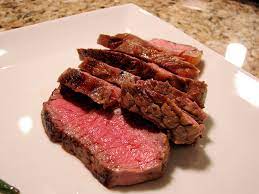Knowing that animal agriculture is responsible for at least 14.5% of all carbon emissions, scientists have been researching alternatives to the traditional meat diet, with the current leading alternative being meat analogs or “fake meats.” The menus of vegan-friendly, trendy restaurants and even your run-of-the-mill spots, like Burger King, have been featuring items such as quinoa burgers, black bean patties, soy chicken, and tofu-flaxseed eggs. In an effort to promote these foods, chefs have been able to make extravagant and seemingly delicious dishes with these ingredients. However, these meat analogs have yet to reach mass acceptance in the general public for one leading reason: People like meat. A 2021 poll by Ipsos found that 89% of Americans report consuming meat on a regular basis, and a majority of those people also reported associating eating meat with the “American way of life.” To combat this issue from a different angle, many startups have been investigating a way to somehow serve “real” meat without raising livestock.
Bioengineer Yaakov Nahmias has been developing a way to produce meat using fermentation tanks and animal cells. His company, Believer Meats Kitchen, takes a piece of animal tissue and selects cells that are capable of self-renewing into fat and muscle cells, which are the cells that make up meat. These cells are then placed in a nutrient-rich broth and multiply until they start to resemble chunks of meat. Nahmias emphasizes that his company does not harm animals and is actively hoping to not only transform the planet but also help countries become food independent. “Our food production ecosystem is unsustainable,” Nahmias told the journalism nonprofit ISRAEL21c. “We are using more than 30% of the land and 30% of the global freshwater supply to make meat, and we’re running out of both.” Manufacturing meat from cell lines and tanks requires 98% less water and 95% less land. This means that countries that are currently producing meat through agriculture could use water and land for other purposes, and countries that are reliant on other livestock-raising countries could potentially self-produce.
While this technology seems to be checking all the boxes, many experts are not confident in its widespread appeal. Meat-eaters may be skeptical of eating anything grown in a lab and anything that does not have the exact texture and taste of traditional livestock. A study conducted by social scientist Chris Bryant found that consumers were less willing to try this new line of meat when they were told it was “lab-grown.” They expanded that the process seemed unnatural and were generally concerned about potential health risks. Even the founder of Believer Meats Kitchen’s 10-year-old son told the Associated Press that he will continue to eat animals because “they are yummy.”
Currently, researchers in the field are working to either make a perfect meat equivalent or a cheap alternative. They are aware that consumers will not spend extra money on their fermentation-tank meat if it does not taste exactly the same. However, the aspect of lowering cost proves to be challenging at the moment due to the extremely essential yet expensive ingredient: growth factors. Without the bath mixture of growth factors and amino acids, the cells will not divide and turn into the desired meats.
“The task of convincing an avid meat lover to eat a steak freshly grown in a lab may arguably be their biggest obstacle yet.”
Once they discover cheaper methods and how to shift cultural norms, Believer Meats Kitchen may be the next Perdue Chicken or Cargill Meat. However, the task of convincing an avid meat lover to eat a steak freshly grown in a lab may arguably be their biggest obstacle yet.






